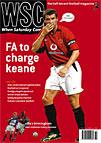 David Harrison explains why Watford decided to sell their stadium again after they had just bought it. It wasn't because they didn't like the colour
David Harrison explains why Watford decided to sell their stadium again after they had just bought it. It wasn't because they didn't like the colour
The trouble with detailing recent boardroom activity at Watford is that the goalposts keep moving – only metaphorically to date, but confidence is dwindling that that is how it will stay. In February 2001, the club confirmed, to widespread local rejoicing, that relocation plans had finally and irrevocably proved fruitless. Three months later they announced they would pay a six-figure sum to buy the ground from the existing freeholders, Punch Taverns, thus “securing their future at Vicarage Road in perpetuity”. Hankies out.
Almost simultaneously, however, Gianluca Vialli was appointed as manager, having seduced certain directors with talk of instant promotion and consequent riches. In the summer proven international stars such as Ramon Vega were invited to join Vialli’s Hertfordshire odyssey. Unsurprisingly, given that he was offered a three-year, £3 million deal, Vega accepted. Others followed on similar terms.
The first hint that this twin-track strategy for reclaiming Premiership status and securing our home was built on sand came at the start of last season, when the holding company, Watford Leisure, floated on the Alternative Investment Market. Fans, encouraged “to participate in shaping the future of the club”, contributed enthusiastically to the £5 million raised. The proceeds, we were told, would go towards strengthening the squad and securing the freehold.
As Vialli’s squad showed not the remotest sign of having the ability or commitment to mount a promotion challenge, talk of a “two-year-plan” began to be heard. Not long afterwards that became a “three-year-plan”. A breathtakingly dreadful season ended with Watford 14th in the First Division, 30 points away from automatic promotion and 16 from the play-offs. The clueless Tuscan was dismissed, under cover of the fall-out from ITV Digital, mercifully taking “Mini-Me” Ray Wilkins with him. The top-notch foreign signings, including the aforementioned Swiss lummox as well as Pierre Issa and Patrick Blondeau, were given seriously large bundles of cash to go away.
Worse was to follow. In July, Watford Leisure announced to the Stock Exchange that it had entered into a “sale and leaseback transaction” of the Vicarage Road freehold. This would appear to indicate that little more than a year after they had promised football at Vicarage Road would be safe “in perpetuity”, they have in fact flogged the place. The club added insult to injury by steadfastly refusing to name the buyer.
The chief executive Tim Shaw assured fans there was “nothing sinister” about the deal. Those who suspected the Saracens sugar daddy and token WFC director Nigel Wray was the buyer were reassured by Shaw’s statement that the purchaser “is a totally unconnected party to either the directors or investors of the plc or the club”. Until later the same day, that is, when Wray emphatically ruled himself back in again by resigning his seat on the board.
Watford’s failing, in common with many others, was to believe that Christmas had indeed arrived when ITV lodged their palpably unsustainable bid for the Football League rights. When it proved not to be the case, selling the ground was one of the few options left open to them in a frantic quest to raise sufficient funds to pay off Vega and chums. The net result of this ill-judged and ill-timed bid to regain Premiership status is a club in distress – back in the First Division and now potentially at the mercy of an anonymous landlord with unknown intentions for Vicarage Road.
From WSC 188 October 2002. What was happening this month